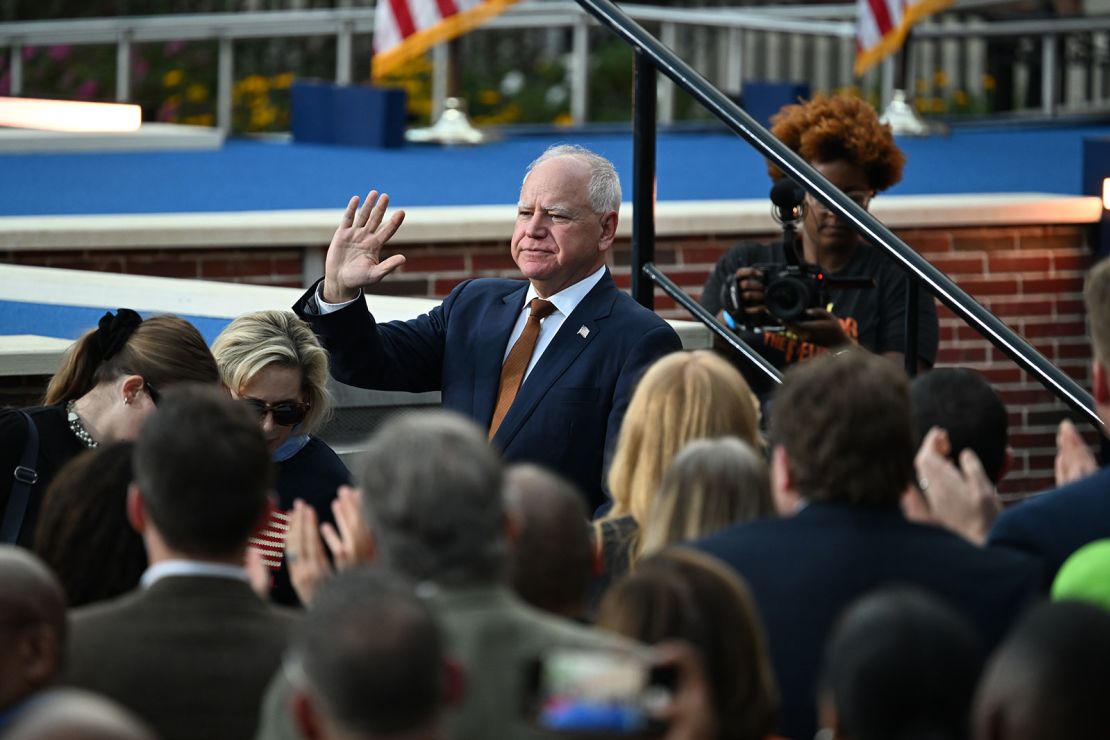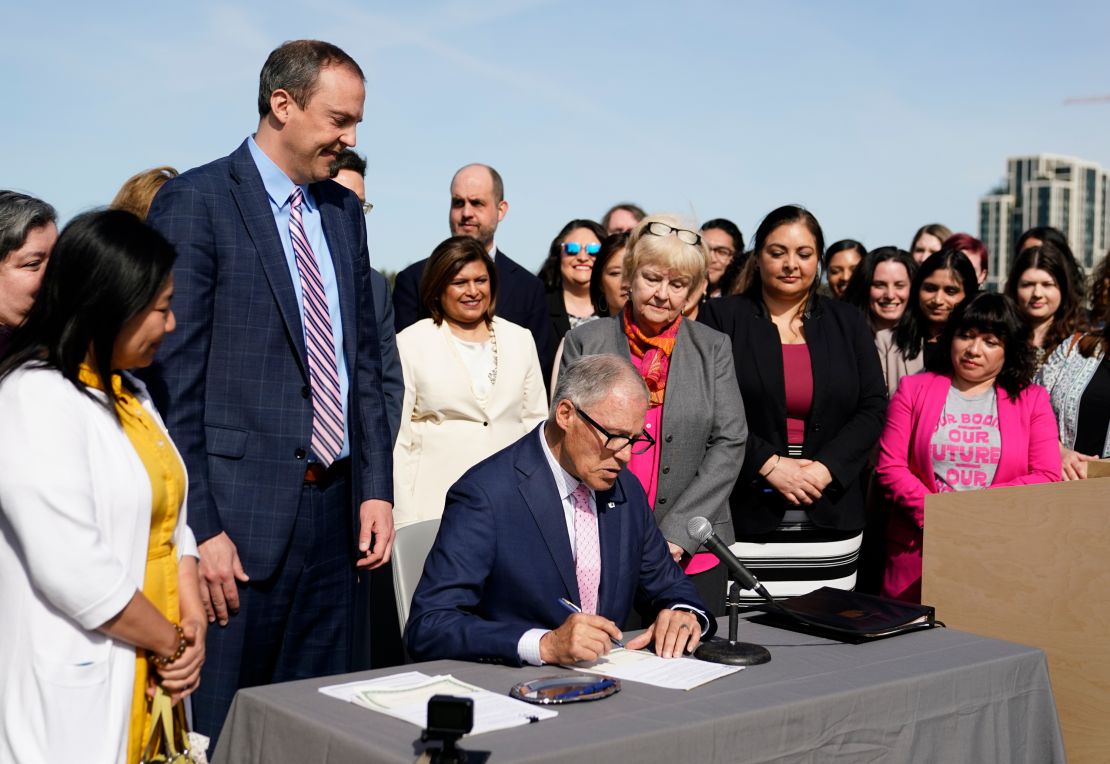Diplomatic and depressed as they have been in public, a small group of Democratic governors are deep into behind-the-scenes preparations and deliberations over how to balance the politics of pushing back on what they are expecting from President-elect Donald Trump’s next turn in the White House.
Since long before the election, they’ve been poring through Project 2025 — it’s helpful, several Democratic governors told CNN, to have a blueprint in public. They’ve been studying their own executive powers and state laws. They’ve been collaborating on how to shame any extreme Trump actions in the court of public opinion, rather than debating the principles, as often happened when Democrats took on Trump last time. They’ve been stockpiling the abortion medication mifepristone in secret warehouses and rehearsing their answers for if and when the incoming White House tries to nationalize their state police or National Guard units for use in deportation raids; some are planning to flat out refuse, while others intend to argue that the officers are busy with other work keeping the people in their states safe. (None have fully wrapped their heads around how it would work if units from other states are sent in and set themselves up for showdowns on the state borders.)
“Really, we have no idea what’s coming down the pike,” said Kansas Gov. Laura Kelly, the chair of the Democratic Governors Association.
Some are already going deeper. Illinois Gov. JB Pritzker frustrated several of his counterparts by trying to get them to sign on to a group he started postelection to push back on Trump, but only Colorado Gov. Jared Polis signed on as a co-chair. Pritzker has his staff exploring ideas such as blocking GPS tracking on apps for women who may be traveling to the state to get abortions, so that there would not be records to potentially subpoena back home.
“We all have apps on our phones that track where we go. If an attorney general or US attorney wanted to pull that data and determine whether someone drove from Indiana to an abortion clinic in Illinois, we can protect people and their privacy,” he told CNN.
How the technology of that might work, though, isn’t clear — and that goes for a number of the more innovative ideas being workshopped.
Plans for Trump underway for months
Many Democratic governors had been working on plans well before even President Joe Biden dropped out of the presidential race and Vice President Kamala Harris became their party nominee. Polls showing Trump’s strength, and their own scars from living through his first term, would have made them irresponsible if they hadn’t been, they say, especially now that his win and the expected compliance of the incoming Republican majorities in the House and Senate make them the only remaining significant nexuses of Democratic power left.
Several have been running tabletop exercises behind closed doors for months, often with state attorneys general and other relevant officials involved. Officials in multiple governors’ offices told CNN the circles have been tight to keep the incoming White House from being able to prepare for their own responses, or for the proactive innovations they’re looking into.
But they’re also wary of playing into caricatures of an outdated resistance, and not just because the 2024 election proved to many that Trump seems to eventually win the politics of most of the “us vs. them” fights. His first term was marked by not approving federal relief funds from Democratic states and by the vengeful withholding of resources, particularly around Covid-19 supplies, for governors who sparked his ire.
Much like French President Emmanuel Macron’s wooing of Trump on the international stage with phone calls and the invitation to the Notre Dame reopening over the weekend — aimed at flattering the incoming president into support on policy — several Democratic governors and top aides say they will also take what they describe as an almost imperial court approach. They don’t want to be on his radar as antagonists.
Figuring the president will again be picking favorites for hundreds of millions in federal aid and other priorities driven often by who he likes and who hasn’t been friendly enough, several have already started the phone calls to Mar-a-Lago to be on his good side, several people told about the calls told CNN.
They’re coming to this weathered with the experience from the first Trump term. Four years ago, for example, Gov. Gretchen Whitmer famously became “the woman in Michigan” whom Trump urged then-Vice President Mike Pence to ignore when asking for Covid help, after she went on TV to criticize the administration for an insufficient response. Supplies weren’t sent as the pandemic death toll ticked up.

Speaking to CNN on the sidelines of a convening of Democratic governors over the weekend in Los Angeles, Whitmer said her goal now is “to be on the radar advocating for Michigan, trying to find common ground and trying to solve problems.”
“People in Michigan, like a majority of Americans, voted for Donald Trump, and my oath is to Michigan,” Whitmer said. “Obviously, I’ve got experience in this type of environment that will help inform how I continue to fight for Michigan. But I know Donald Trump cares about Michigan. And I’m hoping that because of that, we’ll be able to find some common ground in some important ways.”
Whitmer is in a different spot from some of her counterparts. She’s term limited out of running again in 2026 but still trying to think through how much deference to give Michigan voters, who went twice for Trump and once for Biden in between — not to mention the 2028 presidential speculation already surrounding her.
Aides in a number of governors’ offices told CNN that teams of lawyers are deep into researching motions and other responses to potential Trump actions. One Pritzker aide has been traveling the country meeting with counterparts to facilitate the information sharing and sense of preparedness. And Minnesota Gov. Tim Walz, Harris’ running mate, has followed up his postelection speech vowing to work to counter Trump by having “quietly tasked a team of top aides and leaders in state government to make plans for a second Trump term,” according to a person involved in the conversations, who added, “the group is discussing strategies to shore up access to reproductive health care and running tabletop exercises on federal government overreach.”
Over in reliably blue New York, Gov. Kathy Hochul already had one phone call with Trump, telling CNN about appealing to him using peacocking terms such as federal money for a Penn Station “we’re proud of” and how she wants to work “with a president who is a New Yorker, has been a New Yorker, would understand how important it is for the success of our state.”
“It would be irresponsible of me not to anticipate all scenarios of what could happen, especially listening to what the president said, what his advisers have said, what his appointees have said, what his candidates for various positions have said, and what Project 2025 says,” Hochul said. “I have to be keenly aware of all those potential challenges and have a strategy to respond to each if they actually occur. So it’s playing some defense right now, getting the game plan together and being willing to work.”
But thinking about taking on a very aggressive and more experienced administration can be daunting, especially for those newer to the job.
“I can spend a whole lot of time trying to figure out what policies the Trump administration is going to actually execute on,” said Delaware Gov.-elect Matt Meyer. “There’s a whole lot of speculation, and I can read about in the news. We don’t have a whole lot of time to plan on speculation and on various contingencies.”
2028 politics complicating the conversation
As the Democratic Governors Association gathered at the Beverly Hilton — the hotel best known for hosting the Golden Globes and where Richard Nixon ended his first comeback attempt by declaring in 1962, “You don’t have Nixon to kick around anymore!” — Walz swept through the halls, getting a hero’s welcome. Attendees urged him to run for a third term in 2026 and maybe look at a presidential run of his own in 2028, with fans often grumbling as he went by about how they felt he’d been misused on the national ticket. Former Maryland Gov. Martin O’Malley, another former chair of the group, showed up on the first night late at the hotel bar in the hopes of winning some more support in his bid to be the new Democratic National Committee chair, but few in the late-night crowd appeared to realize he was there.

As several of those expected to be in the 2028 presidential conversation side-eyed one another over how those ambitions appear to be playing out already, California Gov. Gavin Newsom appeared, fresh off a special session of the state Legislature he called after the election explicitly “to safeguard California values and fundamental rights in the face of an incoming Trump administration.” Measures on reproductive rights, climate change and immigration were at the top of the list and marked the first bills passed since the election. Pritzker, who arrived late, held court for a while in the hotel lobby. Kentucky Gov. Andy Beshear took a quieter, more hand-to-hand approach, meeting with power brokers but not putting himself out front among Democrats looking for attention among the opposition.
Polis, Pennsylvania Gov. Josh Shapiro and Maryland Gov. Wes Moore did not attend the gathering, but that didn’t stop operatives and lobbyists making the rounds from bringing them up in 2028 chatter anyway. Each has taken a different approach to Trump.
What they all agree on: The Democratic Party desperately needs some better-known new leaders, and governors are the obvious place to look. They just aren’t sure whether getting ahead politically will work better by taking on Trump or by finding ways to co-opt some of the issues that he rode to a return to the White House.
But while some even in private stuck to stock answers about working with Trump when they can and opposing him when they have to, many share a sentiment Hochul voiced at the end of her interview with CNN: “There are lines that cannot be crossed.”
Urged to ‘demonstrate our resolve’
Outgoing Washington Gov. Jay Inslee — one of only two current Democratic governors who served for all four years of Trump’s first term — urged his newer colleagues to dig in, citing his own work “embedding Trump-proofing to the extent humanly, constitutionally possible.”
With supportive Democratic majorities in his state Legislature, Inslee’s efforts have already included blocking immigration officials from going into elementary schools and preventing sharing of data across medical applications with an eye toward that information being used to prosecute women who may get abortions.

Finishing up his third term, Inslee chose not to run again this year. But he said with the combination of what he’s done and the experience his successor, Bob Ferguson, has from suing the Trump administration as state attorney general, Washington state is ready to withstand much of what may be coming.
“I think it’s a combination of two famous speeches: One, Churchill’s ‘We shall fight them on the beaches, we shall fight them in the air, we shall fight them in the landing fields with growing confidence in our power, in the seas, in the air. We shall never surrender.’ That’s the No. 1 advice,” Inslee said. “No. 2 is Bluto Blutarsky in ‘Animal House,’ which is: ‘Over? It’s not over till we say it’s over. Was it over when the Germans bombed Pearl Harbor?’ The combination of those two speeches, I would say, should demonstrate our resolve.”




